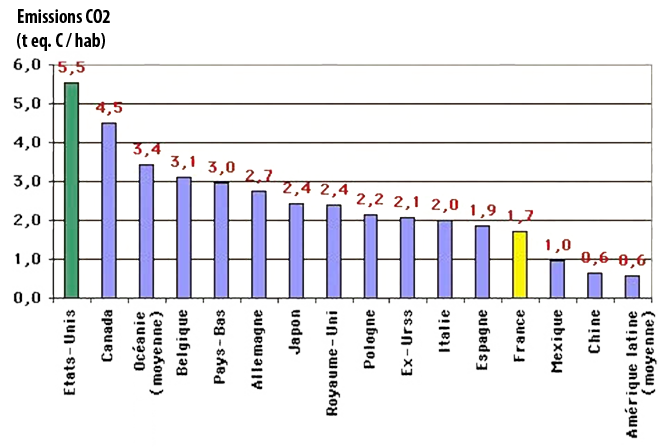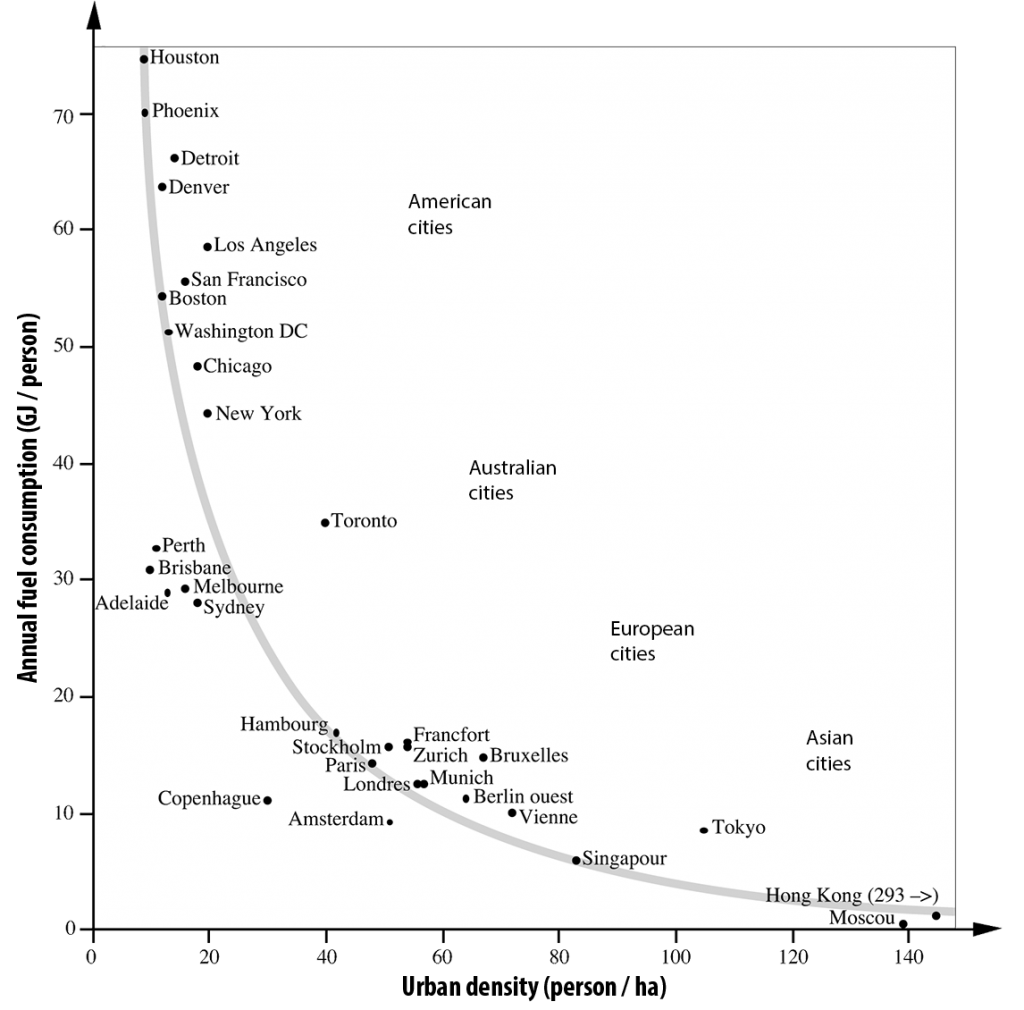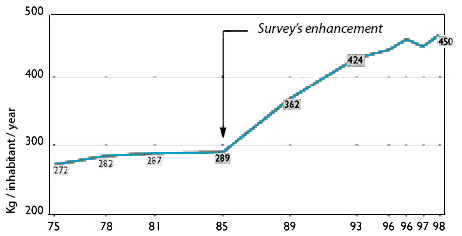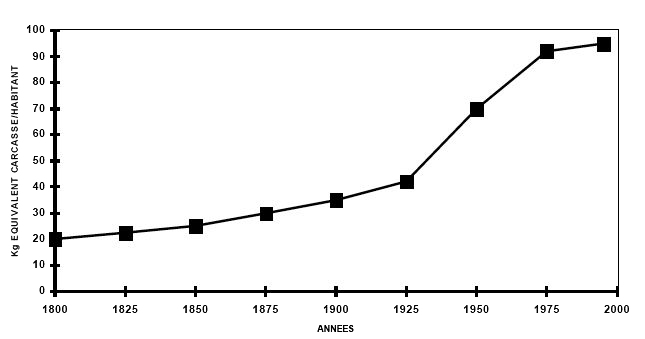There is no doubt that our friends from over the Atlantic are holding a very bad position in the “climate change race”: not only is their country the first emitter of greenhouse gases in the world, with roughly 25% of the planetary total for them only (but less than 5% of the global population), but in addition they have emissions per inhabitant that are among the first in the world.

Greenhouse gases emissions per capita, without land-use change (or sinks), in tonnes carbon equivalent.
The United States have the second largest emissions per inhabitant for the “big” countries, that is those that have more than 10 million inhabitants, behind Australia.
Source : UNFCCC
It is therefore frequent to consider that us French are “good pupils”, that we have already accomplished important efforts, and that we can be put forward as examples to follow regarding the mitigation of climate change in front of the eyes of Americans that would be stubbornly resisting any useful action. Is reality so simple ?
Are Americans more willing than French to “pollute the climate” ?
In order to be very resentful towards Americans, it would be necessary that not only they be large “climate poisonners”, which they objectively are, but also that they be happy to be so and do not have the slightest intention to change anything. When George “Dubiou” Bush declared that “American way of life is not negociable”, and that his country was pulling out of the Kyoto protocol, what did the american citizens think of it ? Did they consider, as their president of the moment, that a decrease of 7% of the US emissions (objective for the US in the Kyoto protocol) was an unbearable sacrifice ?
Of course, a number of polls have been conducted on the subject. Here are the results of one of them, realized in april 2001 by Gallup for a department of Princeton University:
| Question asked in April 2001 | Yes | No |
|---|---|---|
| As you know, George W. Bush has decided that the United States should pull out of the agreement on global warming concluded in 1997 at Kyoto. Do you approve of this decision ? | 25% | 47% |
Here are the results of another poll, conducted in june 2002 for the Chicago Council on Foreign Relations and the German Marshall Fund of the United States:
| Question asked in June 2002 | Yes | No |
|---|---|---|
| Given what you know, do you thing that the United States should participate to the Kyoto Protocol ? | 64% | 21% |
At last, the following question was submitted in 2002 to a panel of Americans: “How do you rate the action of George W. Bush and his administration regarding climate change ?”, and here are the answers (the same question was given to a panel of Europeans to have an element of comparison) :
| Kind of appreciation | United States | Europe |
|---|---|---|
| Excellent | 6% | 2% |
| Good | 19% | 11% |
| Fair | 32% | 27% |
| Bad | 33% | 50% |
| No answer | 10% | 10% |
In other words, only 25% of the American citizens express strong support to the action of George W. Bush regarding climate change, the rest of the population being half hearted or opposed. Then, is it fair to assimilate all a country to its president of the moment, who obviously is not in accordance with his opinion on this particular subject ?
Are the French “cashing in” the results of an effort that begun a long time ago ?
As a will to do bad things does not seem to be more characterized among the population of the United States than in France, only a second element could allow us French to lecture the Americans: that we harvest today the fruits of a constant effort to reduce our emissions that we would have engaged a long time ago.
Well, if we do have emissions per inhabitant that represent only third of what they are for our fellow americans, it happens that it does not owe much to a “climate change consciousness” that we would have had for a long time, but much to history. The relative weakness of our emissions is a byproduct of a number of initiatives that were not taken because of climate change, and among which some are pretty ancient !:
- european – thus french – cities were mostly built centuries ago, at a time when the only available sources of energy were renewables ones (muscles, animal strength, wood, sun….), and our ancestor therefore built dense cities, where distances travelled were short, hence not energy consuming. On the opposite, most of american cities have been built after the discovery of coal and oil, and limitating the distances travelled has not been a primary objective. Thus american cities are not dense, what lengthens the trips and bars the possibility of having efficient public transportation, two elements that push the emissions upwards. But can we Europeans prevail ourselves, today, of decisions that were taken centuries ago, by our ancestors, for totally different reasons than climate change ?

Fuel annual consumption per habitant, in GJ per person (vertical axis) vs urban density of the urban zone, in inhabitants per hectare (horizontal axis).
It is striking that dense european cities have an “energy efficiency” for urban transportation 5 to 6 times better than that of “scattered” american cities.
Source : Newman and Kenworthy, ” Cities and automobile dependance “, Gower, 1989
- France has no more coal, and never had a significant oil or gas production compared to its consumption (in 2002 France produced less than 2% of the oil and less than 1% of the gas it consumed). Our fossil fuels consumption being almost totally imported, our successive leaders have always taken measures that lead more or less to a limitation of their use, like heavy taxes on car fuels. Here also, the first reason of such a behavior had nothing to do with climate change: what was at stake was basically to lighten the amount of the oil bill.On the opposite, the USA long had the rank of first oil producer in the world (it’s over now), and sit on the first coal reserves of the planet. This country thus never considered oil or coal as rare resources, and never felt that their use should be restricted. Can we object to the fact that the US did not build “efficient” cities at a time when nobody cared about the abundance of fossil fuels and greenhouse gases emissions ?
- the french nuclear programme, that leads today to an emission saving of 20% to 40% for a given primary energy consumption, has been decided in the 70’s, that is much before the rise of the “climatic issue” at the end of the 80′. It is definitely an excellent thing to have built these nuclear power plants, but we can hardly present it as a voluntary action to curbe the emissions ! We “inherit” here also of a benefit that was not in the specifications at the time ; back then it was preserving some kind of energetic independance that was the goal. Countries that did not have any kind of problem regarding energy supply, as USA, and that used heavy fuel oil, gas or coal for their electricity production, now have national emissions that are 20 to 40% greater than those of France for a same electric consumption. But once again what was at stake in France was saving oil for energetic independance reasons, not an explicit will to preserve the climate !
Can french leaders lecture american ones ?
The United Nations Framwork Convention on Climate Change (the Kyoto Protocol being a kind of “appendix” to this convention) has been signed in 1992, then ratified, by France, just as by every country in the world (US included). This convention stipulates that it is necessary to “stabilize the greenhouse gas concentrations in the atmosphere at a level that prevents dangerous anthropic perturbations of the climate system” (NB: anthropic means caused by men). This formulation does not give the value of the maximum concentrations that should not be trespassed, but there is at least one thing that such a wording says: one day concentrations will have to stop rising (an indefinite rise will obviously be dangerous one day !), and that means that ALL industrialized countries, France included, will have to lewer their CO2 emissions by 75% to 92%.
If the US will definitely have to make a bigger effort than France, our country will nevetheless have to divide its emissions by 4 to conform to this objective, which is no kid’s play, and will also require major moves in our country. Well, if we put aside the marvellous speeches that we hear here and there, but stick to the facts, we realize that not only no major move to curb the emissions has been made, but that it’s often the exact opposite that has been done, no matter what party is in command:
- the french highways, that totalled 6.680 km in 1990, that is 2 years before Rio, have jumped to 9.300 km in 2000, that is 40% of increase since the beautiful speeches, and is still increasing by 200 to 300 km per year, in spite of the signing of Kyoto. In 2003 our government anounced 12 new projects for the future. It would be surprising to build these infrastructures not to use them afterwards, well using them will lead to an increase of the emissions ; it is therefore perfectly incoherent to build such highways and wish that the road trafic decreases in the same time…
- in 2001 the taxes on car fuels have been lowered, as the taxes on domestic fuel oil (heating is a major source of emissions) and on diesel oil for farmers,
- in 2001 still, a tax on cars (the “vignette”) that was proportionnal to the power of the engine has been suppressed,
- in 1997, the government decided to double the number of landing strips at Paris-Roissy airport, and in 2003 the government (coming from another political party) considered desirable to create a new airport in the west of France, as well as new capacities near Paris,
- the number of supermarkets and hypermarkets, that are large “car suckers” located in the suburbs (for the same amount of sales, suburban hypermarkets induce 2 to 10 times more transportation – for clients and goods – than downtown small stores), and that induce also an increased energy consumption, compared to small stores and open markets, for the heating of the premices and the manufacturing of the goods sold, has gone on rising, with the blessing of everbody in office:
| Year of authorization | 1998 | 1999 | 2000 | 2001 |
|---|---|---|---|---|
| Hypermarkets | 157 915 | 196 684 | 216 768 | 171 809 |
| Supermarkets | 235 814 | 368 891 | 382 186 | 323 738 |
| House equipment | 223 152 | 343 126 | 416 901 | 396 590 |
| Do it yourself equipment | 425 916 | 564 563 | 566 765 | 509 553 |
| Gardening | 308 110 | 446 726 | 484 968 | 386 976 |
| Personnal goods | 75 453 | 153 946 | 197 042 | 183 297 |
| Leisure, culture, sports | 165 882 | 253 067 | 301 825 | 320 502 |
| Others | 261 941 | 375 556 | 463 594 | 380 716 |
| Total | 1 856 181 | 2 704 558 | 3 032 049 | 2 675 182 |
Authorizations for new super/hypermarkets given from 1998 to 2001 by the authorities (square meters of surface).
Source : Ministère de l’équipement, 2003
- the call for a perpetual growth of the consumption of manufactured products is constant whoever is in charge…
Can French citizens lecture american ones ?
Let’s suppose that, just as in the States, our leaders take decisions that are not consistent with what we really wish, and that, in fact, we are prey to an imperious desire to “unconsume” (the reader will probably easily accept the idea that it is not the case !). In order to be in the legitimate position of lecturing the rest of the world, we should be the first ones to follow the right path at the individual level. Well, if we take a close look at what we do when our own consumption is involved, here is what we see:
- since 1992 we have increased our housing space, that afterwards must be heated in the winter (and more and more air conditionned in the summer), with associated greenhouse gases emissions: the housing space per person increased from 34 to 37 m2 (that is a 10% rise) between 1992 and 2002, and we keep building a couple hundred thousand houses and apartments per year (faster than the population rise). Thus, in spite af an increasing level of performance for the newly build housing, and increasing winter temperatures, the overall amount of energy used for heating remains constant (when we should divide it by 2 to 4).
- we fly more and more: air trafic in France has increased by 67% during the decade 1992-2001. Air travel is a major contributor to greenhouse gases emissions: planes that take off from a french airport generate (over the whole flight) emissions that are equivalent to those of half of the french cars. Part of this increase is definitely due to foreigners coming to France, but on the other hand we have also done all we could to maintain this flow of airborne tourists !
- we have gone on throwing more and more waste: +10% in 10 years.

Evolution of the municipal waste thrown per inhabitant and per year in France since 1975
It is not in 1992 that we became “good citizens” !
Source : ADEME
Well this waste represents so much raw materials that had to be produced, what resulted in large emissions of greenhouse gases, and so much waste management afterwards, that will also result in greenhouse gases emissions, though lower than those linked to material production.
- we have – as consumers, nobody forces us ! – kept buying heavier and heavier cars,
| Mass (kg) of new cars sold in France | 1990 | 2000 | Increase 2000/1990 |
|---|---|---|---|
| Gasoline | 904 kg | 1029 kg | 14% |
| Diesel | 1053 kg | 1260 kg | 20% |
| All fuels together | 953 kg | 1142 kg | 20% |
Source : Observatoire de l’Energie, 2002
- More and more powerful,
| Power (in kW) of new cars sold in France | 1990 | 2000 | Increase 2000/1990 |
|---|---|---|---|
| Gasoline | 56 kW | 64,1kW | 14% |
| Diesel | 53,2kW | 69,5kW | 31% |
| All fuels together | 55,1kW | 66,7kW | 21% |
Source : Observatoire de l’Energie, 2002
and that we drive more and more.
| Average number of km driven yearly by car in France | 1990 | 2000 |
|---|---|---|
| All fuels mingled | 13 760 km | 14 031 km |
Source : Observatoire de l’Energie, 2002
- we have gone on eating a lot of meat, when meat production generates emissions that are equivalent to those of the cars in France,

Estimation of the meat consumption per inhabitant (in kg carcass equivalent per year) in France since 1800.,
Source : Bernard Sauvant, INRA
- and I could reproduce the curves representing the number of household appliances that we use, of frozen foods that we buy, of exotic or out of season fruits (often shipped by plane) that we buy ; all these evolutions have their counterparts in terms of greenhouse gases emissions. In short, we will not find many examples to illustrate a profound desire of virtue among french people !
As a matter of conclusion
It seems to me that, before we lecture the Americans on their moral duty regarding the climate, we should start by “sweeping in front of our own doorstep” : certainly, we start from a lower level (still we need to divide our CO2 emissions by 4 !), and, certainly, our yankee friends have efforts in front of them that are far more important than ours to accomplish (they need to divide their CO2 emissions by 12), but, these last years, we have no more taken the turn of the voluntary decrase of greenhouse gases emissions than Americans did.
Of course, I am not advocating that Americans should not do anything since we are not able to show the way: they would be well inspired to start acting a little more vigorously if WE want to avoid an increase of floodings and heat waves in our country. But putting the debate on the grounds of morals is of no use, because our own behaviour does not give us any legitimity to do so.
Our lower emissions (or their higher emissions) are mostly the result of geography, geology, and of several centuries of history ; considering the american behaviour morally reprehensible is, in a way, no more meaningful than reproaching to my fellow french citizens to speak french or love cheese. We must wish that Americans lower their emissions as fast as possible, but, alas, our recent behaviour does not grant us any argument to ask them in the name of morale.